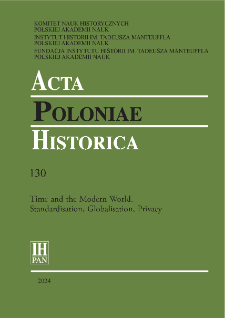- Wyszukaj w całym Repozytorium
- Piśmiennictwo i mapy
- Archeologia
- Baza Młynów
- Nauki przyrodnicze
Wyszukiwanie zaawansowane
Wyszukiwanie zaawansowane
Wyszukiwanie zaawansowane
Wyszukiwanie zaawansowane
Wyszukiwanie zaawansowane

Obiekt
Tytuł: Personal Watches in Warsaw, 1890–1914: Social Meanings
Inny tytuł:
Acta Poloniae Historica T. 130 (2024), Time and the Modern World. Standardisation, Globalisation, Privacy ; Time and the Modern World. Standardisation, Globalisation, Privacy
Twórca instytucjonalny:
Fundacja Instytutu Historii im. Tadeusza Manteuffla Polskiej Akademii Nauk
;
Polska Akademia Nauk, Instytut Historii im. Tadeusza Manteuffla
![]() ;
Polska Akademia Nauk. Komitet Nauk Historycznych
;
Polska Akademia Nauk. Komitet Nauk Historycznych
![]()
Współtwórca:
Instytut Historii Polskiej Akademii Nauk
Wydawca:
Instytut Historii im. Tadeusza Manteuffla Polskiej Akademii Nauk ; Fundacja Instytutu Historii im. Tadeusza Manteuffla Polskiej Akademii Nauk
Miejsce wydania:
Opis:
Abstrakt:
The article discusses the phenomenon of personal watches in the Kingdom of Poland at the turn of the twentieth century. These lands can be considered doubly peripheral: both in terms of power over official time, which was exercised by the administration of the Russian partition (controlled from a centre in the East), and in terms of production of timepieces, which were imported from abroad (produced in the West). The importation of watches, mainly Swiss, was associated with various local practices (advertising campaigns, fabrication of dials with the names of local watchmakers, etc.), and above all, it created a spectrum of attitudes and symbols in the “theatre of everyday life”. The watch was a marker of gender, a symbol of social and professional status, power, and political attitudes; it signified historical memory and loyalty to superiors.
Bibliografia:
Donzé Pierre-Yves, Des nations, des firmes et des montres: histoireglobale de l’industriehorlogère de 1850 à nosjours (Neuchâtel, 2020).
Frykman Jonas and Orvar Löfgren, Culture Builders: A Historical Anthropology of Middle-Class Life, transl. Alan Crozier (New Brunswick, NJ – London, 1987).
Głębocki Wiesław, Zegarmistrzowie warszawscy XIX wieku (Warszawa, 1992).
Goffman Erving, The Presentation of Self in Everyday Life (Edinburgh, 1956).
Kiepurska Halina, Warszawa 1905–1907 (Warszawa, 1991).
Łukasiewicz Juliusz, ‘Zmiany kierunków szlaków handlowych w Królestwie Polskim w drugiej połowie XIX wieku’, Przegląd Historyczny, lxiv, 4 (1973), 823–38.
McCrossen Alexis, Marking Modern Times: A History of Clocks, Watches, and Other Timekeepers in American Life (Chicago–London, 2016).
Mrugalski Zdzisław, Historia zegarmistrzostwa w Polsce (Radom, 2011).
Żarnowska Anna, Robotnicy Warszawy na przełomie XIX i XX wieku (Warszawa, 1985).
Czasopismo/Seria/cykl:
Tom:
Strona pocz.:
Strona końc.:
Szczegółowy typ zasobu:
Format:
Identyfikator zasobu:
oai:rcin.org.pl:244530 ; 2450-8462 ; 0001-6829 ; 10.12775/APH.2024.130.01
Źródło:
IH PAN, sygn. A.295/130 Podr. ; kliknij tutaj, żeby przejść
Język:
Prawa:
Licencja Creative Commons Uznanie autorstwa 4.0
Zasady wykorzystania:
Zasób chroniony prawem autorskim. [CC BY 4.0 Międzynarodowe] Korzystanie dozwolone zgodnie z licencją Creative Commons Uznanie autorstwa 4.0, której pełne postanowienia dostępne są pod adresem: ; -
Digitalizacja:
Instytut Historii Polskiej Akademii Nauk
Lokalizacja oryginału:
Biblioteka Instytutu Historii PAN
Dofinansowane ze środków:
Dostęp:
Kolekcje, do których przypisany jest obiekt:
- Repozytorium Cyfrowe Instytutów Naukowych > Kolekcje Partnerów > Instytut Historii PAN > Czasopisma
- Repozytorium Cyfrowe Instytutów Naukowych > Kolekcje Partnerów > Instytut Historii PAN > Wydawnictwa Instytutu
- Repozytorium Cyfrowe Instytutów Naukowych > Kolekcje Partnerów > Instytut Historii PAN > Wydawnictwa Instytutu > Czasopisma
- Repozytorium Cyfrowe Instytutów Naukowych > Kolekcje Partnerów > Instytut Historii PAN > Wydawnictwa Instytutu > Czasopisma > Acta Poloniae Historica
- Repozytorium Cyfrowe Instytutów Naukowych > Piśmiennictwo > Czasopisma/Artykuły
Data ostatniej modyfikacji:
27 mar 2025
Data dodania obiektu:
27 mar 2025
Liczba pobrań / odtworzeń:
1
Wszystkie dostępne wersje tego obiektu:
https://rcin.org.pl./publication/281400
Wyświetl opis w formacie RDF:
Wyświetl opis w formacie RDFa:
Wyświetl opis w formacie OAI-PMH:
| Nazwa wydania | Data |
|---|---|
| Brzostek, Błażej (1977– ), Personal Watches in Warsaw, 1890–1914: Social Meanings | 27 mar 2025 |
Obiekty Podobne
Litwinowicz-Droździel, Małgorzata
[Gozduś, K.]
Penkała-Jastrzębska, Anna (1988– )
Biernat, Andrzej (1949– )
Ryszewska, Katarzyna
Demski, Dagnosław

 INSTYTUT ARCHEOLOGII I ETNOLOGII POLSKIEJ AKADEMII NAUK
INSTYTUT ARCHEOLOGII I ETNOLOGII POLSKIEJ AKADEMII NAUK
 INSTYTUT BADAŃ LITERACKICH POLSKIEJ AKADEMII NAUK
INSTYTUT BADAŃ LITERACKICH POLSKIEJ AKADEMII NAUK
 INSTYTUT BADAWCZY LEŚNICTWA
INSTYTUT BADAWCZY LEŚNICTWA
 INSTYTUT BIOLOGII DOŚWIADCZALNEJ IM. MARCELEGO NENCKIEGO POLSKIEJ AKADEMII NAUK
INSTYTUT BIOLOGII DOŚWIADCZALNEJ IM. MARCELEGO NENCKIEGO POLSKIEJ AKADEMII NAUK
 INSTYTUT BIOLOGII SSAKÓW POLSKIEJ AKADEMII NAUK
INSTYTUT BIOLOGII SSAKÓW POLSKIEJ AKADEMII NAUK
 INSTYTUT CHEMII FIZYCZNEJ PAN
INSTYTUT CHEMII FIZYCZNEJ PAN
 INSTYTUT CHEMII ORGANICZNEJ PAN
INSTYTUT CHEMII ORGANICZNEJ PAN
 INSTYTUT FILOZOFII I SOCJOLOGII PAN
INSTYTUT FILOZOFII I SOCJOLOGII PAN
 INSTYTUT GEOGRAFII I PRZESTRZENNEGO ZAGOSPODAROWANIA PAN
INSTYTUT GEOGRAFII I PRZESTRZENNEGO ZAGOSPODAROWANIA PAN
 INSTYTUT HISTORII im. TADEUSZA MANTEUFFLA POLSKIEJ AKADEMII NAUK
INSTYTUT HISTORII im. TADEUSZA MANTEUFFLA POLSKIEJ AKADEMII NAUK
 INSTYTUT JĘZYKA POLSKIEGO POLSKIEJ AKADEMII NAUK
INSTYTUT JĘZYKA POLSKIEGO POLSKIEJ AKADEMII NAUK
 INSTYTUT MATEMATYCZNY PAN
INSTYTUT MATEMATYCZNY PAN
 INSTYTUT MEDYCYNY DOŚWIADCZALNEJ I KLINICZNEJ IM.MIROSŁAWA MOSSAKOWSKIEGO POLSKIEJ AKADEMII NAUK
INSTYTUT MEDYCYNY DOŚWIADCZALNEJ I KLINICZNEJ IM.MIROSŁAWA MOSSAKOWSKIEGO POLSKIEJ AKADEMII NAUK
 INSTYTUT PODSTAWOWYCH PROBLEMÓW TECHNIKI PAN
INSTYTUT PODSTAWOWYCH PROBLEMÓW TECHNIKI PAN
 INSTYTUT SLAWISTYKI PAN
INSTYTUT SLAWISTYKI PAN
 SIEĆ BADAWCZA ŁUKASIEWICZ - INSTYTUT TECHNOLOGII MATERIAŁÓW ELEKTRONICZNYCH
SIEĆ BADAWCZA ŁUKASIEWICZ - INSTYTUT TECHNOLOGII MATERIAŁÓW ELEKTRONICZNYCH
 MUZEUM I INSTYTUT ZOOLOGII POLSKIEJ AKADEMII NAUK
MUZEUM I INSTYTUT ZOOLOGII POLSKIEJ AKADEMII NAUK
 INSTYTUT BADAŃ SYSTEMOWYCH PAN
INSTYTUT BADAŃ SYSTEMOWYCH PAN
 INSTYTUT BOTANIKI IM. WŁADYSŁAWA SZAFERA POLSKIEJ AKADEMII NAUK
INSTYTUT BOTANIKI IM. WŁADYSŁAWA SZAFERA POLSKIEJ AKADEMII NAUK




































